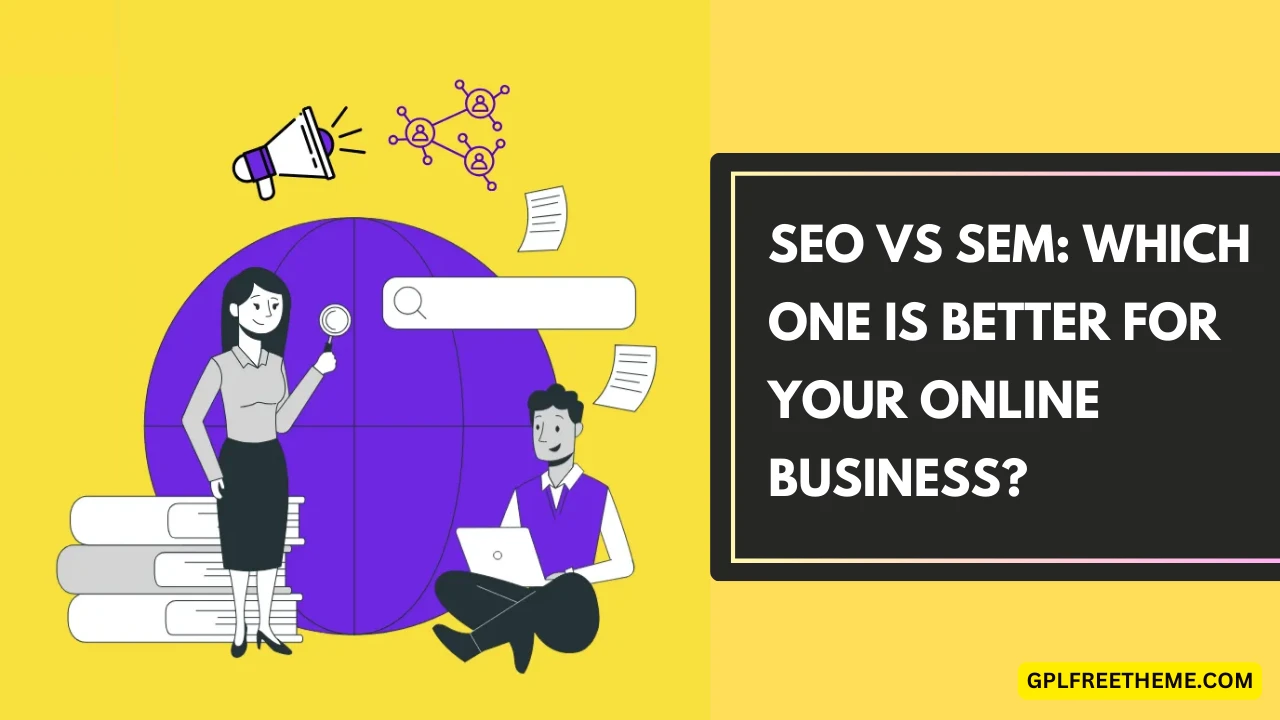Search engines play a major role in helping people find relevant information to make informed decisions.
This allows business owners to take advantage of search engines and deliver their message to the desired audience. You can do this through search engine optimization (SEO) or search engine marketing (SEM), which combines SEO with pay-per-click advertising.
In this article, we will highlight the key differences between SEO vs SEM to help you choose the best strategy to grow your business.
What Is SEO?
Search engine optimization (SEO) refers to improving your website by following search engine guidelines to get better rankings than your competitors. This is a non-paid way to get more visibility for your brand through search engines – 67% of users only see the top five search results.
Typically, you create content around questions that align with your topic and optimize it.
However, you’re not the only one targeting the questions that best represent your target audience’s interests. Your competitors do the same. So, the goal is to outperform your competitors and be on top in search engine recommendations.
In other words, climbing the search engine rankings is the key to driving more organic traffic to your website.
Let’s look at some tips to improve your SEO:
Select the Right Keywords
Before creating content, you should select the right keywords that best represent the needs and preferences of your target audience.
This requires you to conduct keyword research to find out the words or long phrases that your audience uses to find relevant information through search engines.
You may consider leveraging free keyword research tools or a premium solution like SEMrush or AIOSEO to find targetable keywords.
When starting, consider finding long-tail keywords, as they are generally easier to rank for. For example, if we take the best web hosting service keyword, the tool shows that it takes a lot of work to rank.
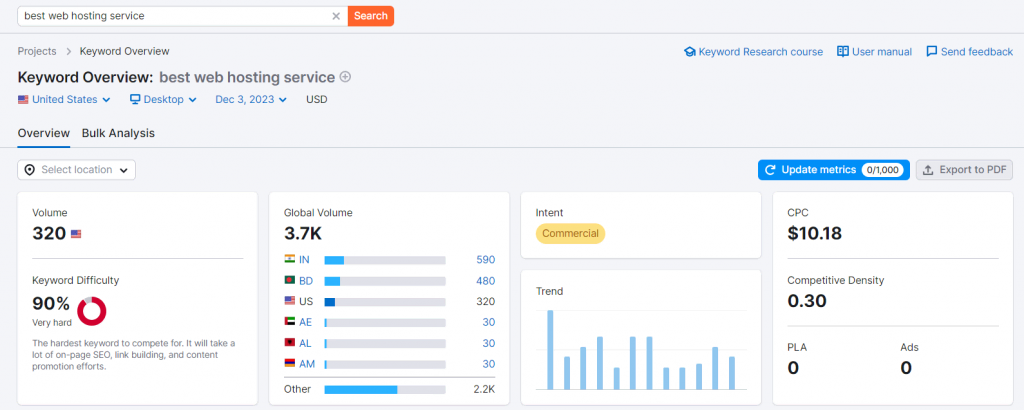
As a result, we recommend targeting less popular keywords like the best hosting for freelancers.
On-Page Optimization
Apart from choosing the right keywords, you must know how to use them in your content to top the search engine ranking charts.
This is where the on-page optimization process begins to provide visitors with a seamless user experience and create content that best serves their search intent.
This requires you to understand what information people want to find when they use certain keywords to locate search engines.
For example, if someone uses the search query What is web hosting? it means they want to learn about web hosting.
In this case, we recommend that you start your page with a rather detailed explanation of pricing and additional features.
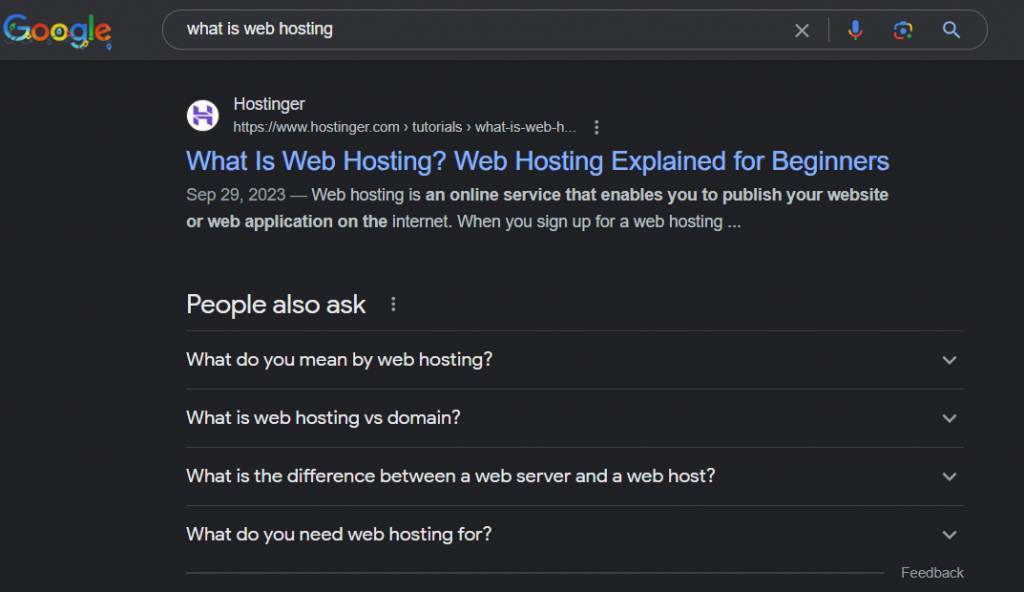
However, users searching for web hosting services already know what web hosting is, and now they are interested in finding the best web hosting options or solution providers.
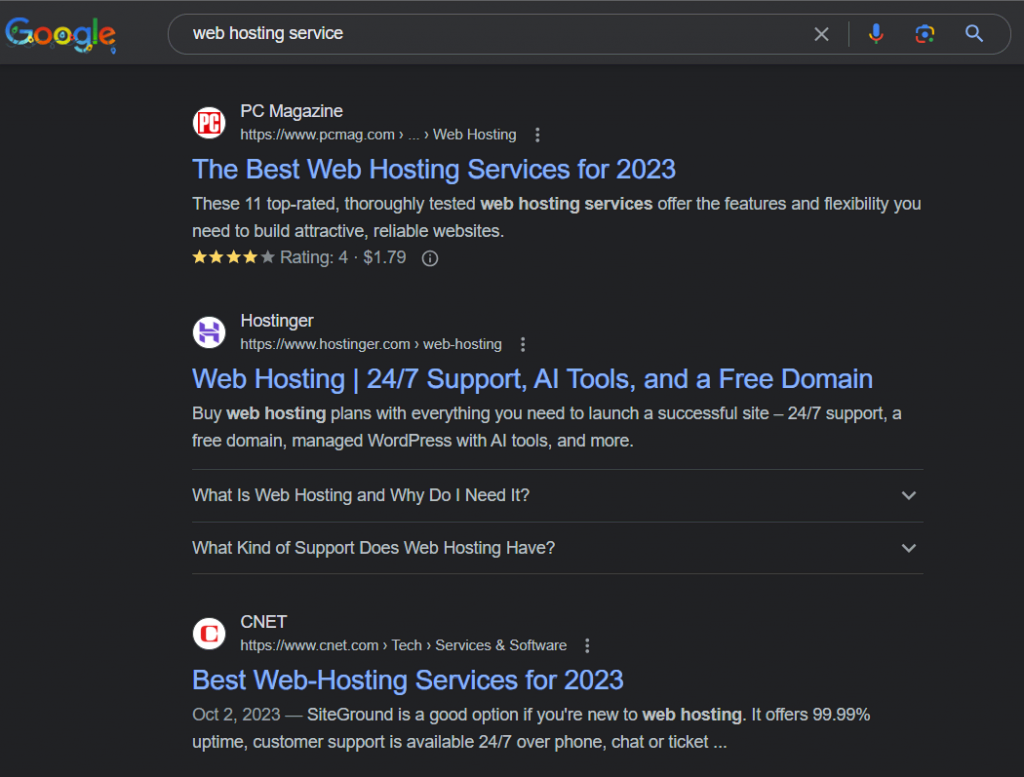
In addition to meeting intent, on-page optimization requires skillful use and strategic placement of focus keywords in your content, page URLs, titles, descriptions, and images.
This helps you provide a seamless experience to your visitors, which in turn increases your search engine rankings.
Off-Page Optimization
As the name suggests, off-page SEO refers to your actions outside the website to help it rank higher on search engines. These include:
- Social media – create and share relevant content with your target audience.
- Branded searches – leverage social proof and encourage ratings or reviews for your products or services.
- Quality backlinks – ask for other website owners to link to your site. One of the best ways to do so is by offering to write a guest post.
We recommend paying the most attention to high-quality backlinks as they have a significant impact on your search engine rankings. 91% of websites do not get any organic traffic from Google due to the lack of quality backlinks.
Technical Optimization
Technical optimization enables search engine bots to find and crawl your content easily. As a result, your website pages get indexed more quickly.
Technical SEO helps search engines understand your website structure and content hierarchy to determine your ability to provide an excellent user experience.
Make sure you are not preventing search engines from crawling your website to help them evaluate your pages for appropriate rankings.
What Is SEM?
Search engine marketing includes search engine optimization and pay-per-click advertising (PPC).
Since we’ve already covered the basics of SEO, let’s talk about the other component of search engine marketing – PPC.
Pay-per-click advertising refers to leveraging third-party platforms such as search engines to generate traction and attract relevant audiences.
Basically, you pay to be at the top of search engine recommendations with sponsored disclaimers.

Then, whenever a user clicks on the sponsored content, the company pays an agreed amount to the ad publisher.
Since pay-per-click advertising produces results faster than organic marketing, businesses often use it to achieve short-term goals.
Let’s take a look at the essential components of PPC to learn more about search engine marketing.
Keyword Research
To get started with pay-per-click advertising, it is essential to identify keywords that can help you achieve your goals.
Most of the time, businesses choose PPC to increase their revenue. This means they can generate inquiries with commercial or transactional intent to get a better return on investment from their ad campaigns.
On the other hand, you can also take advantage of pay-per-click advertising for other goals, such as creating awareness of your brand. However, this can be very expensive.
No matter what your goal is, it can be useful to use keyword research tools, as they help you estimate average traffic volume when targeting a particular query.
Additionally, these tools can help you estimate the average cost per click, which typically ranges between $2-4 for a standard search ad campaign. As a result, if you see a higher amount of money, we recommend considering moving to another keyword.
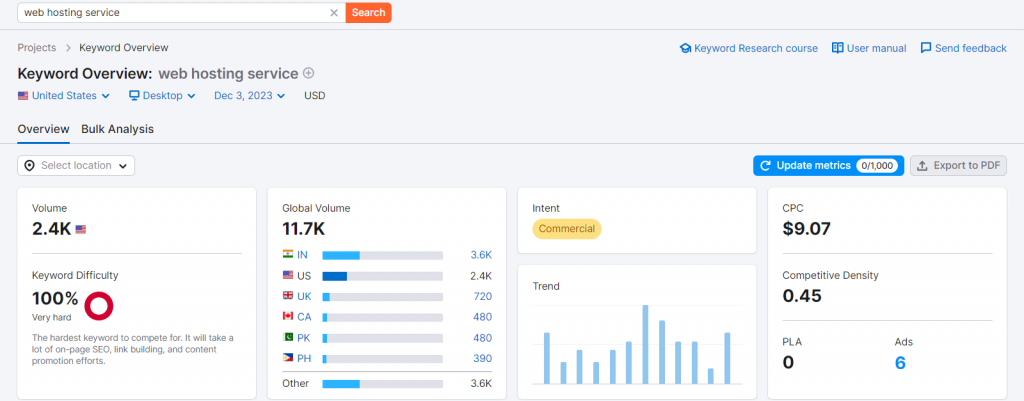
This information is essential for you to have a high-performing PPC ad campaign. Remember that the goal is to target relevant but high-volume keywords that represent low competition and the lowest cost per click.
Bidding
Once you’ve identified relevant keywords for your PPC ad campaign, the next step is to come up with a bid strategy.
Bidding is like negotiating with search engines. You decide the amount you want to pay ad publishers or search engines whenever a user clicks on sponsored content.
Note that if your ads are similar to your competitors in terms of quality and they outrank you, search engines will prefer to display their content.
As a result, your ads may perform poorly due to not enough people clicking on them.
Ad Copy
Once you’ve developed an efficient bidding strategy, start focusing on creating well-thought-out ad copy.
An ad copy is the message your target audience sees the moment they stumble upon sponsored content.
Remember that even if you get ahead of your competitors and get your ads displayed on search engines, it is your copy that inspires your audience to click and consider the information you are giving them. want.
Audience Targeting
Even after identifying the right keywords, coming up with a high-performing bidding strategy, and creating persuasive ad copy, your ads may still perform poorly if they aren’t displayed to the right people.
To avoid this, you need to decide about the audience you want to attract through pay-per-click advertising.
You can target a particular audience based on various characteristics like demographics, interests, locality, shopping preferences, and much more.
The goal here is to display your ads to people interested in what you have to offer because they will likely click on the sponsored content.
Key Differences Between SEO vs SEM
As stated earlier, SEM includes SEO and pay-per-click advertising. Since search engine optimization is a part of search engine marketing, that leaves out pay-per-click advertising.
The following are some of the differences to consider before deciding on a marketing strategy for your business:
Content vs Budget
Search engine optimization depends on the quality of your content, while pay-per-click advertising is a budget-oriented strategy.
When you want to generate traction organically, you need to create content around relevant queries and optimize it according to search engine guidelines.
This way you attract the right audience and inspire them to consider visiting your website to find out more information.
Your budget, on the other hand, controls your pay-per-click ad campaigns.
This is one of the reasons why small businesses stick to creating useful content for their audiences to achieve better search engine visibility.
Since they have more limited budgets, it is almost impossible for them to compete with the industry giants. Additionally, they can speed up their content creation processes with free AI SEO tools.
Perpetuity vs Quickness
Another thing that differentiates search engine optimization from pay-per-click advertising is the results you get from both.
As stated earlier, search engine optimization requires you to produce relevant and high-quality content to get the desired results.
Once you’ve created and published your content, you may not be able to get the results you want quickly. Search engines take time to crawl and evaluate your content to determine appropriate rankings for your pages.
As a result, SEO requires that you be consistent and patient to see your efforts translate into the desired results.
This is not the case with pay-per-click advertising. PPC makes it possible to get quick results from your efforts.
You don’t need to wait for search engine bots to crawl your pages to display your ads. As soon as your campaign goes live, you’ll start seeing results almost immediately.
This is why businesses often prefer PPC to achieve their short-term goals. Plus, it’s a great solution when you want to take advantage of a hot trend or speed up your lead-generation process.
User Intent
Search engine optimization and pay-per-click advertising also vary depending on intent.
Intent refers to the behavior of users when they use a particular query to locate search engines for relevant information.
In general, there are four main types of search intent:
- Informational – users want to learn more about a particular topic.
- Navigational – users start looking for more information sources.
- Commercial – users consider purchasing a product or service, but they haven’t made the final decision.
- Transactional – users are ready to purchase.
Search engine optimization serves all these purposes. With it, you can help people find relevant information, build awareness of your brand, and capture quality leads for your sales funnel.
Pay-per-click advertising, on the other hand, typically serves a commercial or transactional intent. Using it, you pay search engines to help you showcase the capabilities of the solutions you offer and attract relevant audiences.
Impact
The results of your search engine optimization efforts and pay-per-click advertising vary greatly.
It may take some time for search engine optimization to get you promising results. However, an SEO-friendly website has a lasting impact compared to pay-per-click advertising.
When you organically drive traffic to your website, you increase leads step by step. You educate your target audience and help them make purchasing decisions. This way, you earn their trust and promote thought leadership in your respective industry.
People begin to consider you a reliable source of information and keep coming back to you for more information.
Pay-per-click advertising, on the other hand, works differently. You often target people who have already made up their minds to buy something. You simply reach out to them and present your solutions so that they consider you among other options.
Also, in terms of engagement, the impact of your paid ad campaigns is short-lived. As soon as you remove the controls from your ads, the results you were seeing will disappear.
Conclusion
There you have it – the key differences between SEO and SEM. The article covered each concept in great detail to help you understand the terms and choose what’s right for you, especially when you have just gotten started.
Remember that neither of the strategies trumps the other in terms of effectiveness. It’s all a matter of your preferences and goals. To recap:
- Search engine optimization – a long-term strategy that requires more effort and time as you need to create and optimize your content. On the other hand, it is a budget-friendly option.
- Search engine marketing – a short-term strategy that gives you instant results and doesn’t require much time to prepare. However, it might be very expensive.
To get the best results and experience better search engine visibility, we recommend going for search engine marketing, as it encompasses both SEO and PPC.
FAQs: SEO vs. SEM – Choosing the Right Approach for Your Online Business
What’s the difference between SEO and SEM?
- SEO (Search Engine Optimization) focuses on improving your website’s organic ranking in search engine results pages (SERPs). This involves optimizing your website content, building backlinks, and improving user experience.
- SEM (Search Engine Marketing) encompasses both SEO and paid advertising like Pay-Per-Click (PPC) ads. While SEO aims for free visibility, SEM allows you to pay for prominent ad placements on SERPs.
Which one is better for my business?
There’s no one-size-fits-all answer. Both SEO and SEM have their advantages and disadvantages, and the best strategy for you depends on your specific goals, budget, and industry.
Advantages of SEO:
- Long-term results: Once your website ranks organically, you can enjoy consistent traffic without ongoing payment.
- Higher ROI: Organic traffic tends to convert better than paid traffic, leading to better cost-efficiency in the long run.
- Brand building: Higher organic ranking leads to greater brand trust and authority.
Advantages of SEM:
- Faster results: Pay-per-click ads can drive targeted traffic to your website immediately after launching your campaign.
- Precise targeting: You can fine-tune your ads to reach specific demographics, interests, and search terms.
- Measurable results: You can track your PPC campaign performance in real-time and adjust your budget and targeting as needed.
Should I use both SEO and SEM?
Combining SEO and SEM can be a powerful strategy, leveraging the strengths of both approaches. This is often known as a “search engine marketing strategy”.
- SEO provides a solid foundation: By optimizing your website for organic search, you increase your chances of success with paid advertising.
- SEM can boost initial traffic: PPC ads can drive targeted visitors to your website while your SEO efforts are paying off in the long run.
- Synergy: A cohesive SEO and SEM strategy can improve your overall brand visibility and online presence.
How much do SEO and SEM cost?
- SEO: While SEO itself is free, it requires dedicated time, effort, and often tools or expertise. The cost can vary depending on your DIY capabilities or whether you outsource services.
- SEM: You pay for each click on your ads, so the cost depends on your chosen keywords, competition, and campaign goals. You can set daily or monthly budgets to manage your spending.
Where can I get help with SEO and SEM?
Many resources are available to help you understand and implement SEO and SEM strategies. Consider:
- Online tutorials and guides: Several websites and blogs offer comprehensive resources on both SEO and SEM.
- Digital marketing agencies: Many agencies specialize in search engine marketing and can offer tailored strategies and campaign management.
- Freelance SEO and PPC specialists: You can hire individual professionals to handle specific aspects of your SEO or SEM efforts.
